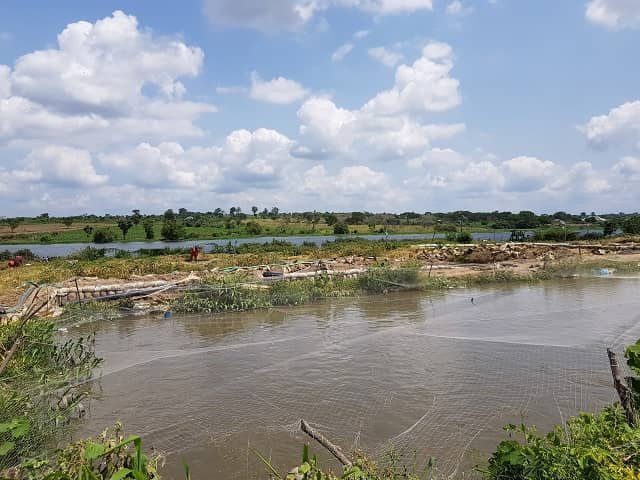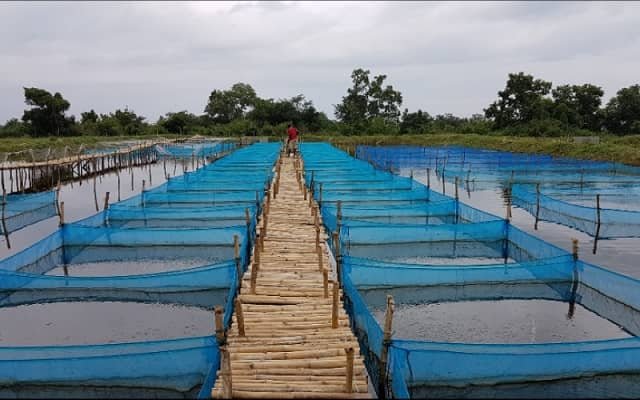
Traditionally, the aquaculture industry has operated under a linear model (“take-make-dispose”) that generates considerable waste, including a significant portion of marine plastic debris. The transition towards a Circular Economy (CE), where waste is minimized and reintegrated as resources, is fundamental for the sustainable future of the sector.
A recent study published in the International Journal of Data Science and Analytics by researchers from Trust-IT Services and Broad Horizons Consulting Ltd. explores how data management under FAIR principles can be an essential catalyst for this transition in aquaculture. The FAIR principles aim for data to be Findable, Accessible, Interoperable, and Reusable, by both humans and machines.
- 1 The Circular Economy in Aquaculture
- 2 What is FAIR Data and Why is it Key for Circular Aquaculture?
- 3 Tangible Benefits of Applying FAIR Data in Circular Aquaculture
- 4 Barriers Hindering the Adoption of FAIR Data
- 5 Key Enablers to Boost FAIR Adoption
- 6 Preliminary Roadmap Towards 2030: Key Recommendations
- 7 Conclusion: A Sustainable Future Driven by Data
- 8 Entradas relacionadas:
The Circular Economy in Aquaculture
The concept of CE, which seeks to regenerate resources and eliminate waste, is increasingly relevant. The study, based on interviews and questionnaires with key stakeholders in the sector, identified several applicable CE practices already in use (although unevenly) in aquaculture:
- Recycling, Reuse, Repair, and Remanufacturing: Mainly of nets and equipment from the cages.
- Eco-design: Manufacturing components that are more durable and easier to reuse and recycle.
- Aquaponics: Integration of fish farming with hydroponics, using fish waste as fertilizer.
- Recirculating Aquaculture Systems (RAS): Intensive technology that allows for the reuse of water and nutrients.
- Other practices such as wastewater treatments, biofilters, and bioaccumulation.
While 75% of respondents showed familiarity with the CE concept, the adoption of these practices is variable, indicating a gap between knowledge and effective implementation.
What is FAIR Data and Why is it Key for Circular Aquaculture?
FAIR principles are crucial for data to be shared and used efficiently across scientific and industrial domains, facilitating informed decision-making.
- Findable: Easily discoverable.
- Accessible: They can be accessed effortlessly (under defined conditions).
- Interoperable: They can be integrated with other data using semantic rules.
- Reusable: They can be replicated and used in different contexts.
Despite their advantages, the study reveals that familiarity and adoption of FAIR principles in aquaculture are still low: only 17% declared themselves “very familiar,” while 27% had never heard of them. Adoption is equally limited, with only 9% always applying them and 28% never. Furthermore, only 26% of those who use them measure their impact.
Tangible Benefits of Applying FAIR Data in Circular Aquaculture
Adopting FAIR principles can transform data and resource management in the sector, providing direct benefits for CE implementation:
- Better Data Access and Discovery: Facilitates finding information on waste types, enabling their reuse and tracking the performance of circular practices.
- Precise Monitoring: Allows for more accurate monitoring of systems (like RAS) and waste consumption or generation, identifying inefficiencies.
- Harmonization and Standardization: Helps to unify the visualization and management of diverse datasets and processes, promoting best practices.
- Resource Optimization: Allows datasets to be ‘recycled’ and readapted, generating environmental and potentially economic benefits by identifying reuse opportunities.
- Accelerated Learning: The exchange of FAIR data accelerates the learning curve for companies in developing sustainable management systems (environmentally, economically, and socially).
Barriers Hindering the Adoption of FAIR Data
Despite the benefits, there are significant obstacles to implementing FAIR in circular aquaculture:
- Lack of Skills and Knowledge: Considered the most crucial barrier. Many stakeholders lack the technical skills to build interoperable infrastructures or understand the benefits of FAIR.
- Confusion with “Open Data”: There is an erroneous fear that FAIR implies openly sharing all data, including sensitive data, which generates resistance due to fear of losing competitive advantage.
- Costs and Lack of Investment: Implementation requires investments in infrastructure, training, and maintenance, resources that are often lacking, especially in SMEs.
- Fragmentation and Interoperability: Data are often scattered across different non-interoperable systems, making their integration and reuse difficult.
- Cultural Barriers: A “my data is mine” mentality hinders collaboration and exchange, preventing the leveraging of collective benefits.
Key Enablers to Boost FAIR Adoption
The study also identifies factors that can facilitate FAIR adoption in the sector:
Stay Always Informed
Join our communities to instantly receive the most important news, reports, and analysis from the aquaculture industry.
- Reduction in Data Acquisition Costs: A FAIR system makes it cheaper and easier to find data, allowing efforts to be invested in solving already identified problems.
- Regulations and Best Practices: Clear laws and guidelines can incentivize (or compel) companies to make their data more efficient and FAIR.
- Awareness of Benefits: Educating about the concrete advantages of FAIR can dispel fears and promote adoption.
- Innovation and Training: Creating data exchange platforms and training professionals (creating roles like “data stewards”) can increase accessibility and knowledge.
- Incentives for Collaboration: Programs offering compensation (financial or recognition-based) for sharing data can foster cooperation.
- Reduction of Complexity: Developing standardized technological solutions and management software that simplify FAIR implementation.
Preliminary Roadmap Towards 2030: Key Recommendations
Based on the findings, the study proposes a roadmap with six strategic recommendations to foster a circular aquaculture supported by FAIR data, aiming to achieve significant progress by 2030:
- Policies for Renewable Energy: Promote policies that incentivize the use of renewable energy in aquaculture production, sharing best practices through FAIR systems.
- Incentivize the Exchange of Best Practices (Materials and Technologies): Foster knowledge exchange on reuse, recycling, repair of materials, and on the implementation of aquaponics and RAS, through financial and non-financial compensation.
- Create New Professional Roles (Data Stewards): Foster the creation of specialized jobs (‘data stewards’) that support aquaculture stakeholders in managing and ‘FAIRifying’ their data, transferring knowledge and overcoming skill barriers.
- Make Interoperable Systems More Affordable: Invest in the development of interoperable systems, seeking economies of scale to reduce the costs associated with FAIR adoption.
- Policies for CE Standards in Aquaculture: Issue policies that promote the adoption (and creation if necessary) of specific standards for the circular economy in aquaculture, facilitating interoperability and FAIR implementation.
These recommendations have political, technological, social, and environmental implications, and Key Performance Indicators (KPIs) are proposed to measure their impact in relation to the Sustainable Development Goals (SDGs).
Conclusion: A Sustainable Future Driven by Data
The transition towards a circular economy is vital for the long-term sustainability of the aquaculture industry. This study underscores that FAIR data management principles, although still little adopted in the sector, represent a powerful tool to facilitate this transition.
While significant barriers exist such as lack of skills, costs, and cultural resistance, the benefits in terms of efficiency, resource optimization, innovation, and sustainability are clear. Overcoming these obstacles requires a coordinated effort that includes supportive policies, investment in technology and infrastructure, training, fostering collaboration, and fundamentally, a cultural shift towards the shared value of well-managed data. The roadmap proposed by the study’s authors offers an initial path for sector stakeholders to begin working towards a more efficient, sustainable, and circular aquaculture, leveraging the power of FAIR data.
Contact
Rita Giuffrida
Trust-IT Services
Via Francesco Redi, 10, 56124, Pisa, Italy
Email: r.giuffrida@trust-itservices.com
Reference (open access)
Giuffrida, R., de Majo, C., Giuffrida, M. et al. FAIR data management practices to introduce circular economy in aquaculture: benefits, barriers and a preliminary roadmap. Int J Data Sci Anal (2025). https://doi.org/10.1007/s41060-025-00765-4
Editor at the digital magazine AquaHoy. He holds a degree in Aquaculture Biology from the National University of Santa (UNS) and a Master’s degree in Science and Innovation Management from the Polytechnic University of Valencia, with postgraduate diplomas in Business Innovation and Innovation Management. He possesses extensive experience in the aquaculture and fisheries sector, having led the Fisheries Innovation Unit of the National Program for Innovation in Fisheries and Aquaculture (PNIPA). He has served as a senior consultant in technology watch, an innovation project formulator and advisor, and a lecturer at UNS. He is a member of the Peruvian College of Biologists and was recognized by the World Aquaculture Society (WAS) in 2016 for his contribution to aquaculture.




